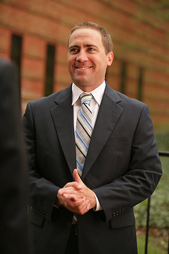

Case Study
Sustainability and Social Responsibility course for top Executive Education program
Client:
Owen Graduate School of Management, Vanderbilt University
Role:
Course Developer; Co-Instructor
Services Offered:
Training & Workshops
Problem/Issue:
Effective business leadership and management in the 21st century requires a thorough understanding of the important social and environmental responsibilities and opportunities that are emerging in today's global, transparent, and natural resource-constricted market. Future business leaders need to understand how sustainability and corporate social responsibility (CSR) issues are relevant for their businesses, and should be able to create and implement strategies that produce financial, environmental, and social value for their companies.
Our Analysis:
J. Gowdy Consulting was hired to develop and lead a course on
Sustainability & Social Responsibility: Creating Financial, Environmental, and Social Value for the Executive Education program at Vanderbilt University’s Owen Graduate School of Management.
The two-day course used the value chain analytical model to identify strategies for practices that create triple-bottom line wins for business: financial improvements, social improvements, and environmental improvements. The class began with lecture and discussion on stakeholder theory, relevant terminology, and current company best practices. Students then examined three levels of value chain analysis:
- Internal: Students created an analytical model to identify win/win/win scenarios that focused on the stakeholder relationship with employees and shareholders.
- Suppliers/Vendors and Customers: Looking one step up and down the value chain, students conducted the same analysis on close stakeholders.
- Sourcing Agents and Distributors: Students looked to the ends of the value chain with end-of-life agents, e.g. recyclers.
The class culminated with participants using the value chain model to develop and customize sustainability and social responsibility initiatives for their own companies, identifying win/win/win scenarios and crafting draft action plans.
Students completed the two-day course with the ability to translate CSR and sustainability terminology and philosophy into relevant, smart business practices. They understood how organizations can simultaneously create and optimize economic, environmental, and social value while also managing complex stakeholder relationships, and learned how develop and manage metrics that will measure and maximize impact.
One student, Patrick Brennen – the Sustainability Manager for Ingram Barge – provided feedback: “The value chain analytical model presented in this class provided the foundation for our company to construct our sustainability strategy that will result in improvements in both our financial and environmental/social performance.”



